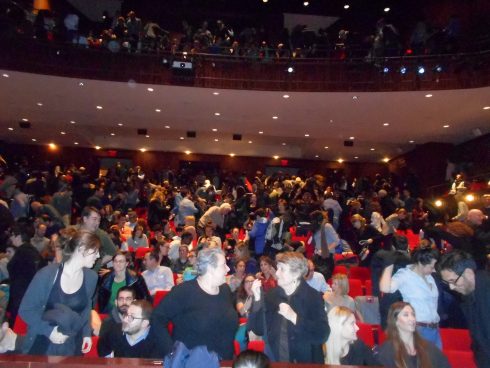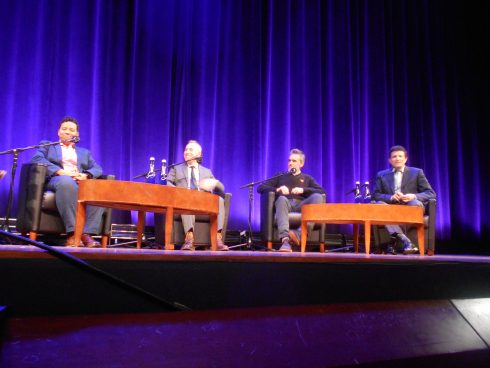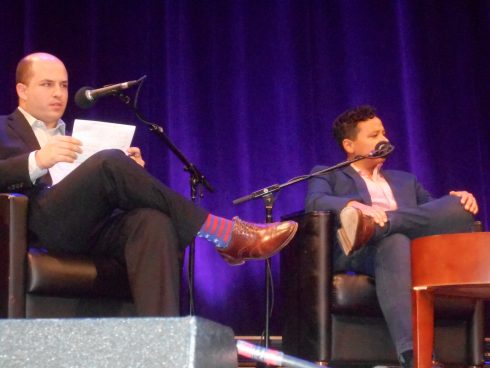Trump’s Attacks on the Press get Fierce Blowback from Top NYC Journalists

Sold out crowd at NYU’s Skirball Center auditorium

From left, Lydia Polgreen, Huffington Post; Jacob Weisberg, Slate; Borja Echevarria, vice president and editor- in- chief of Univision and David Remnick, The New Yorker

CNN’s Brian Stelter, moderator
Photos by Mary Reinholz
By MARY REINHOLZ
Article 12, Virginia Declaration of Rights, 1776: “…The freedom of the press is one of the greatest bulwarks of liberty and can never be restrained but by despotic governments.”
He has demonized reporters as among “the most dishonest creatures on earth.” Stephen K. Bannon, his rightwing chief strategist, has called them the “opposition party” and said they should just “shut up.”
Donald J. Trump’s long running war against the traditionally Democratic press grinds on. But five days into his first term as Republican president of the United States, the former real estate mogul turned commander in chief got some fierce blowback from a group of top journalists meeting on stage at New York University’s Skirball Center auditorium in Greenwich Village.
They had gathered there for a panel discussion, titled “Not The New Normal,” on how to cover America’s new president in a changing media landscape pockmarked by fake news, “alternative facts” and outright lies, many emanating from the White House, they said.
“How do you cover a beast like Trump?” inquired press critic Jay Rosen, also a NYU journalism professor, in his introduction. He contended that Trump had begun his political career attacking the legitimacy of president Barack Obama’s birth certificate and “came to power in part by turning the press into a hate object. It’s of a piece with…the normalization of lying at the high levels of power.”
Given what he described as a “post-fact, post-truth” political climate that disparages even scientific evidence, Rosen predicted the press would have a difficult time combating Trump’s varied falsehoods even if it “publishes Watergate style revelations.”
His remarks received prolonged applause from attendees at the sold out event. It was sponsored by Slate with proceeds from the sale of the $30 tickets going to the Committee to Protect Journalists.
The panelists took questions from the audience, many of them NYU journalism students. One older man took the mic and complained that journalists were becoming wussies. He cited as an example the failure of reporters to” stick up” for CNN’s JIm Acosta afte President -electTrump refused to answer his questions after the release by BuzzFeed of an unverified “dossier”that included details of Trump’s alleged ties with Russia and his purported romps with Russian prostitutes in a Moscow Hotel. CNN reported the story but did not release the full dossier.
Trump called Acosta “fake news” and branded CNN a “terrible organization.”
“Sam Donaldson and Leslie Stahl would have been outraged” by the attack, the man said of Trump’s “blackballing” of Acosta,”but no one said anything. They just went on to the next question and nobody stood up to Trump. Nobody stood up for their colleague!”
A panelist in response speculated that Acosta’s peers didn’t want to lose total favor with Trump and get passed over by him in future news conferences.
CNN’s Brian Stelter served as the moderator for the 90-minute forum while outside a huge group of noisy demonstrators roared their disapproval of Trump’s immigration policies. The panelists were David Remnick, editor of The New Yorker; Jacob Weisberg, chair of the Slate Group and creator/host of Trumpcast; Borja Echevarria, vice president and editor- in- chief of Univision and Lydia Polgreen, the new editor- in- chief of Huffington Post.
Stelter first asked Polgreen if Huffington Post considered itself at war with Trump. “We certainly don’t want to be at war with the the president of the United States,” she said, adding, however, that Trump seems to “need a bogeyman. He needs someone to point to as the culprit who’s getting away with his trying to make America great again. At one point it was immigrants; at another point it’s muslims. I think we’re a very convenient target. I think we have to find ways to armor ourselves against this notion. Our weapons are the traditional ones: dispassionate fact based reporting.The question is: is this enough?”
Weisberg observed that Trump has clearly withstood journalistic scrutiny thus far. “It’s a matter of record that Donald Trump is flim-flam man,” he said. “Just read his autobiography. It tells you that he lies. We have a spectacular amount of information about his life as a businessman and as a politician. But he won! He occupies the Oval Office. So there’s a huge job to be done.”
The panelists also attacked Kellyanne Conway, the high level Trump advisor who often speaks for him to media. Conway came up with the phrase “alternative facts” when asked by NBC’s Chuck Todd on “Meet the Press” about her boss’s claims of the crowd size at his inauguration.
“Alternative facts are lies,” shouted Stelter. “What are we to make of Kellyanne Conway? Is this the first step towards an authoritarian society?”
“‘1984’ is the now the number one best seller,” replied Polgreen, referring to George Orwell’s dystopian fable. “Make of that what you will.”
Remnick referred to Conway’s two words as “that piece of linguistic refuse,” drawing laughter from the crowd. “It encapsulates a mass psychology that can swallow people.”
Weisberg sounded an upbeat note for journalists in the new age of Trump. “We are not in a jail cell or a court room. I’m going back to my office and talk to people on the radio. Freedom is here. I just want to look back and be proud of we do because it’s an incredible privilege. ”
The panelists also criticized themselves. Polgren said there has been a erosion of trust,” in the media particularly among “low information” working class Americans who voted for Barack Obama in 2012 but turned to Trump in 2016.
Echevarria of Univision said it was important to explain to audiences “that this is not about the media. This is about freedom of information and freedom of speech. It’s not about us.”
For his part, Remnick enjoined journalists to “buck up. This is the time, like never before, to do your work ferociously and honestly and fearlessly. And as down as you may feel, in so many ways there is wind at your back.”
Remnick then spoke about the “hundreds of thousands of people” in the streets of Washington D.C. for the women’s march one day after Trump’s inauguration on Jan. 0. “They were saying something to that person in the White House. “I’m not going to lay down.”
He added:”This is not the election of a conservative as opposed to a liberal or Republican versus a Democrat. Something else is afoot. An authoritarian demagogic style has come to power. If you’re not energized by that prospect as a journalist, then you should become a certified public accountant.”
“Trump is good for us,” Polgin said with a laugh, adding that his conduct produces “great copy, great television, great stories for The New York Times and The New Yorker. It sounds crass, but reporters jockey in those briefings” for access.
Remnick made it plain he was not impressed by press briefings even by a U. S. president. “The worst thing that can happen is that you get shut out. But my feeling is that no great stories come out of press briefings.”
Remnick and the other panelists suggested that reporters should consider boycotting Trump’s press briefings or at least show “more solidarity” with each other. Weisberg suggested cancelling the annual White House Press Correspondents dinner.
#
Mary can be reached at reinho4@aol.com
Comments
Leave a Reply
You must be logged in to post a comment.



